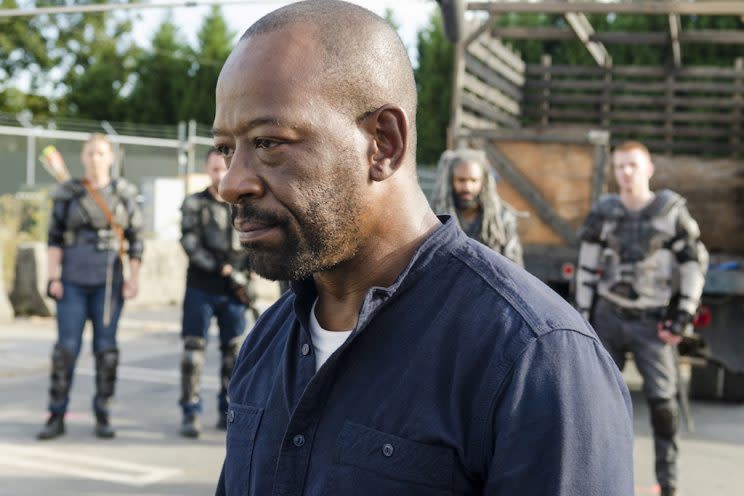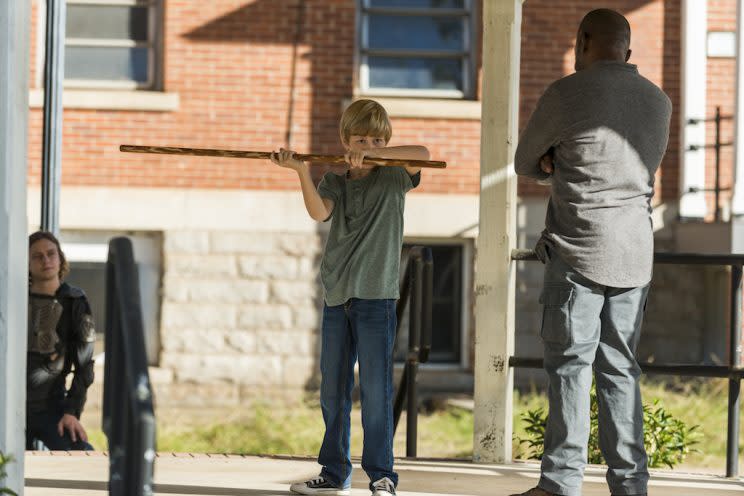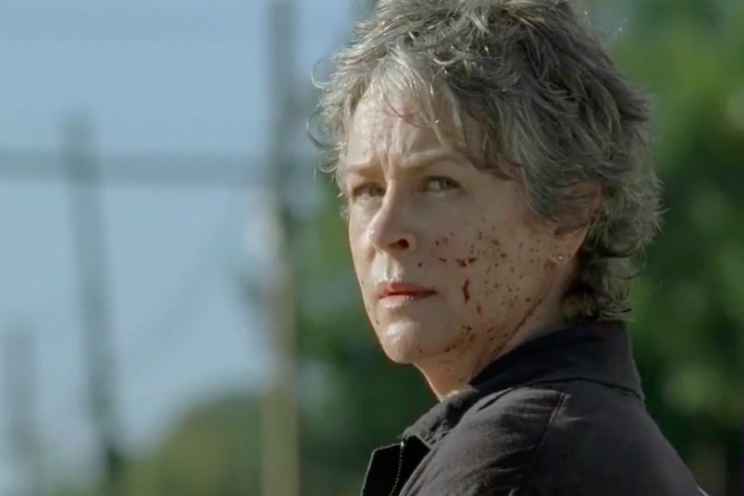‘The Walking Dead’ Postmortem: Scott Gimple on Sparking Morgan’s Trauma and the New Jerry

Warning: This interview for the “Bury Me Here” episode of The Walking Dead contains spoilers.
The Walking Dead showrunner Scott Gimple penned this latest, and saddest yet, entry in the oft-traumatic journey of Morgan Jones (Lennie James), and he talked to Yahoo TV about how seeds for this Season 7 storyline were planted all the way back in Season 5. He also delved deeper into what makes Morgan tick, what breaks his heart, and what — specifically — pushed Morgan into multiple breakdowns and a new resolve to kill the Saviors one-by-one.
Gimple also spoke about Nabila, the newest delightful Kingdom dweller who’s sure to become a fan favorite, as well as the “rat-faced” Savior who’s definitely going to be on a lot of viewer and Kingdomite hit lists after “Bury Me Here.”
Related: ‘The Walking Dead’ Recap: Of Weevils and War
Last week’s Rick and Michonne adventure was so fun, such a great chance for those characters to bond and really let each other know how much they care about and respect each other. Different story this week. Was “Say Yes” kind of the last point in this half of the season where there is going to be that opportunity for lightness?
That’s a great question. You know, even in the finale, there are a few moments — I can think of one very pronounced moment of lightness between Rick and Michonne that is funny and awkward and weird. I think it isn’t exactly [“Say Yes”], but there’s something pretty nifty in there.
Very cool, because we know, obviously, after “Bury Me Here,” things are really starting to converge now…
We must say that the title is not misleading, as far as the happy factor of the episode.
Very true. You wrote Season 3’s “Clear,” you wrote Season 6’s “Here’s Not Here,” you wrote this episode. They kind of make up a Morgan trilogy, though, happily, his story does not end as a trilogy. You have written all of these episodes that are such pivotal Morgan stories. Is it fair to say that you have some special feeling for that character?
I love writing all the characters. The writers do amazing jobs and thus don’t have to do this, but I love writing the show and I wish I could write more. I also like writing episodes that aren’t necessarily premieres or finales. But, I’d say that in the Morgan of it all, writing “Clear,” I was so happy to be able to do that episode and was real happy with the way it came out. I’m a huge fan, of course, of the show itself, of the pilot, which is probably the ultimate one in [Morgan’s] story. But, what happened was, I had to figure out those instances where Morgan pops up. So I had to kinda write “Here’s Not Here,” at least know that story, before Season 5. “Here’s Not Here” was 20 episodes later. I’d done just a lot of work on it before Lennie [James] had even returned to the show for the brief moments that we got him in Season 5. I don’t know, it was just stuck in my head a great deal, and even with “Here’s Not Here,” I had been thinking a bit more of where he would wind up in Season 7, so it really is just that I had done a lot of the work in my head already, and I do love writing the character, I do love the story… but I shan’t play favorites. Really, there isn’t a character on the show you could name that I wouldn’t want to tell really big stories with. Because I have wonderful writers, and I have a host of responsibilities on the program, I don’t get to do it that much, but it really is probably the favorite thing I do on the show. I love all the different things I have to do, but [this] script I got to do as a treat. I was so busy with all the other aspects of the show, but I really was kind of ground down — I just wanted to do something, I’ll use the word, fun, or at least satisfying in a different way. There were a bunch of late nights and a lot of stolen hours, but it was very, very cool to tell this third chapter of the Morgan story.
Having gotten into the groove of having to think a little further ahead for the Morgan storyline, are you still thinking far in advance for him, in a different way than you are for any other character?
I think he might have caught up now with everybody else. Everybody is mapped out pretty far for their big arcs, but I think he’s basically kept pace with everybody right now.

What does Morgan represent to you? The character, when we meet him, is a pretty average guy. He’s a heartbroken husband and a dad desperate to save his son, who is all he has left. Unlike Rick, who is this lawman and has, I think, a lot more confidence than Morgan does. But Morgan also really becomes this everyman who seems destined, especially after this episode, to maybe always wrestle with what he’s willing to do to survive in this world.
I think Morgan is a very good man. I think the way that he and Rick are both introduced in the pilot, individually, we see that these are decent people. And I was totally a viewer back then. I read the book before the show came out, and then I watched the show. I didn’t come on until Season 2, and I liked both Rick and Morgan when I met them in the book and on the show, because they were these decent people. The thing that changes Morgan isn’t even the things he has to do or that there are choices [regarding] survival. The thing that changed Morgan was trauma. That’s what “Here’s Not Here” was about. And trauma is something that affects people in a very individual way. I can only speak on this as someone who has read about it, and that’s important, because I’m definitely a tourist in this area, not an expert or [someone] struggling with this. I certainly don’t want to act like I understand it in any intimate way, but the things that I learned about it by reading about people’s experiences with it is that it is like being trapped in a moment or in moments, in feelings, mental and physical, and it affects people in incredibly traumatic ways. It changes them, and that is what we were trying to represent with “Here’s Not Here.” That is the thing that Morgan struggles with, trauma. And the way that he found peace from it was through this person he met, Eastman, who gave him some tools and some philosophy that could help ground him. I’m not gonna say that’s exactly the way it works in real life, but we tried to reflect somewhat on how real life could work, aspire to work, but it isn’t about good and evil with Morgan. It’s about the way that he can perceive the world after trauma. And as soon as Benjamin’s killed, he’s trapped in that place once again.

He has a breakdown in the street after Benjamin dies. He recovers enough to go on that second trip to deliver the single cantaloupe to the Saviors, where he kills Richard. Is that Morgan experiencing another breakdown, or is it him kind of doubling down on what Richard had planned, to pacify Gavin’s group, because at this point Morgan has made the decision that he is going to have to fight?
I love that question, and I hope this isn’t a cop-out, but I really do believe it’s a little of both. I believe that it’s the rage that makes him kill Richard, but I believe that somewhere in his head he knew that he was essentially fulfilling Richard’s plans, because he speaks words to Gavin directly. That’s exactly what Richard told him in the room… “we understand.” Choking Richard to death with his bare hands, that’s rage. But, what he says to Gavin… he’s totally doing what Richard essentially put [in his mind] to do.
So he has definitely decided by that point to fight the Saviors, and to recommend to Ezekiel that the Kingdom joins up with Rick?
Oh God yes. And even what he says to Carol… he walks up to Carol’s house, he knows exactly where that’s gonna lead. If he tells Carol that he’s gonna go fight them and he wants them gone, telling Carol [about the Saviors] could help make that happen. And it’s all very tragic. This person who had found peace, being so dark now that he would even enlist someone else who, granted, Carol wanted the truth, but he would even pull her into it… very sad and very tragic. I don’t know if the whole of the audience would think that way. Maybe the whole of the audience will feel that he’s stepping up. But, I think he has that stick that Eastman gave him and that Eastman altered there, he was walking around with that stick in the woods stabbing people in the throat. And then Eastman cut off the edge of that stick and made it into a tool for him to learn aikido with and to find a way to channel the trauma with, and now at the end of this episode, he’s sharpening that stick again.
Related: ‘The Walking Dead’ Postmortem: Lennie James on Morgan’s Breakdown and Why He Kills Again
He also turns and looks inside the cottage in the final scene. What does that mean?
I would only take it as, he’s in hyper vigilance mode. Any little sound, he’s gonna be set off, because of the place that he’s in. There’s no one in the house.
I actually thought it was more maybe a callback to “Clear,” and that, in the mental state he’s in right now, maybe there’s a certain amount of paranoia or, I guess, intense anxiety, with Morgan.
Oh, yeah, that’s absolutely it. He is in that place where he is not right. He is not completely gone right now. He isn’t, but it’s there. He could go for a good while where he’s not bothered, but it will accumulate, and it will metastasize, and it will come back to haunt him.
One of the saddest aspects of Benjamin’s death is the end of his friendship with Morgan. They were really developing a father/son vibe, too, especially when he gifted the painting to Morgan and Morgan teased him about this girl he likes.
It is. And that’s what fueled that amount of intensity, that rage. Benjamin was an innocent, and [Jared the Savior] murdered him right in front of him. For someone like Morgan, who is keeping the wolves at bay, it’s not gonna end well if he doesn’t have support, if he doesn’t have help in the apocalypse. He got very lucky once, finding that help. In [our] world, we have those tools, and people have a hard enough time finding their way to those tools, but for Morgan, seeing something like that in the situation he lives in, with the pressure he’s under, it’s tragic. What’s even more tragic in some ways is, is it perfect if this traumatized person, with that much rage, is now pitted against the Saviors? Is it exactly what Rick and Maggie and Ezekiel need? It’s sad, because, oh, great, take out a lot of Saviors, you’re gonna help them get their lives back, but yet Morgan has lost all this progress he’s made.

Carol talks Morgan into staying in the cottage while she goes off to stay in the Kingdom. Is that her way of saying, “I had my little timeout from the realities of what we have to do, and it’s your turn now,” or is that really her wanting to try to ensure that someone can have the opportunity to not go out and kill people?
I think it’s more of the latter. She absolutely is activated when she learns what she learns [about Negan killing Glenn and Abraham]. Carol would always [have been] activated by that, but she doesn’t like the idea of Morgan just going out there. By him staying there… there’s some connection that she could potentially see how he’s doing, that she knows where he is. It’s something I love about how their relationship’s been developed, that there’s this incredible connection between these two. It’s not romantic, but they are now impossibly, through these insane circumstances, family, and she does care about him, and she knows she’s not going to cure him. But at least she knows where he is. And maybe he knows that she cares. There’s something bittersweet about that, and it was important to me to underline that relationship, because I think that that’s at least a little bit of a light in this arc.
It’s this weird sort of respect they have, that they were on different sides of the issue the whole time, and now they’ve both wound up on the same side but he’s not who he was. And he felt responsible in so many ways for some bad things that have happened. She feels responsible for him. I really like the relationship between the characters, and the actors themselves are so magnificent. It’s like, “Wow, it’s Lennie and Melissa [McBride]” — I need to write toward the height of my ability, but if my abilities fall short, it’s Lennie and Melissa. To see them wind up the way they are, I think that’s one of the great pleasures of serialized television, to develop these relationships slowly and see them evolve and to be in this place so far from where they met. I quite love it.
And other things to love: Nabila (Nadine Marissa), another endearing Kingdomite we just met. She’s funny and friendly and immediately likable, like Jerry. Will we find out more about her?
I hope we haven’t seen the last of her. I loved what she did. She’s very much emblematic of the Kingdom, of this very strong, very singular spirit, and I was so thrilled with that performance. And it’s a tricky exchange there, also reacting to a tiger that’s out there. I don’t think we’ve seen the last of Nabila. I’m glad you bring that up. I think we’ll see more of her. And I would say that I think she’s a little tougher than Jerry. I think Jerry’s a little sweeter. Nabila, she doesn’t have the size or the reach of Jerry, but I think she’s a little tougher.
Nor does she have the extreme fondness for cobbler that Jerry has.
Yes, yes. We had a fine cobbler moment this episode.
And more on Jerry: Jared, the “rat-faced prick,” as Benjamin so memorably named him, not only killed sweet Benjamin, but he dared to leave a mark on the face of our beloved Jerry. He’s gotta die, right, and painfully?
Yes, oh my God, yeah. Gonna have to look after himself. America will be none too pleased with him.
The Walking Dead airs Sundays at 9 p.m. ET on AMC.
Read more from Yahoo TV:
‘The Walking Dead’ Postmortem: Scott Gimple on Sparking Morgan’s Trauma and the New Jerry
What to Watch This Week: ‘This is Us’ Wraps First Season, Netflix Premieres ‘Iron Fist’ and More
‘American Housewife’ Sneak Peek: Viv Goes Shopping But Katie Has Buyer’s Remorse
